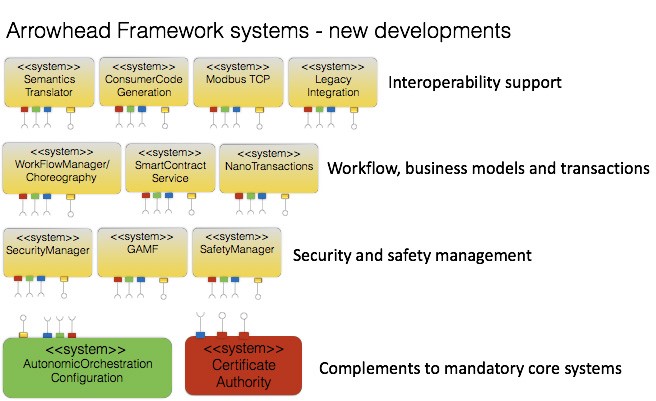Integration and interoperability platform – Arrowhead Framework
The interoperability and integration platform will be built upon the Arrowhead Framework. The current Arrowhead Framework release is v4.0 The current TRL level of these systems are 4-8. Most of the current development of Arrowhead Framework core systems is supported by projects like e.g. Productive4.0, FAR-EDGE, MIDIH, Semi40.
The Arrowhead Tools ambition is to move all v4.0 core systems to TRL7+ and that a general release of v5.0 is made as a major result of Arrowhead Tools.
In addition a number of the Arrowhead Framework core system are being investigated an developed within the same projects. These are: a) Security Manager b) Safety Manger c) Autonomous security issue detection and mitigation d) Smart Service Contract e) ConsumerCodeGeneration f) Autonomous orchestration/conguration g) Legacy Integration

The mandatory core systems of Arrowhead Framework already are qualied at TRL 7+. The focus in this project will be on performance and stability. Performance improvements are expected to enable increased exibility in solution architecture engineering impacting both engineering and HW investment costs.
For the inter cloud core support systems, Gatekeeper and Gateway currently at TRL 6, stability and performance is focused. Inter cloud service exchange set up time is expected to be reduced by more than 50% contributing to engineering exibility and overall solution performance and TRL7+ qualication.
For the interoperability core system Translation the focus will be maturing of existing protocol and encoding translation and additions of more protocols like e.g. uPnP and DDS, conditioned by the use case requirements. Regarding the very complex problem of semantics translation the experimental core systems developed in Productive4.0 will be further matured by investigations and development of the Consumer- CodeGeneration, LegacyIntegration, ModbusTCP and SemanticsTranslator targets TRL of 3-6.
Regarding security support provided by the core system, SystemRegistry, DeviceRegistry and the associated on-boarding procedure, focus is on maturing them to TRL7. For the core system CerticateAdministration also inherited from Productive4.0 the focus will be on maturing it to TRL6.
For the core systems, QoS(Quality of Service), EventHandler and DataManager, the focus will be on maturing, performance and functionality extension, corresponding to the use case requirements targeting TRL5-6.
The engineering support core system, PlantDescription, Conguration, SmartServiceAgreement, Work- FlowManager/Choreography and NanoTransaction are expected to be matured, conditioned the use case requirements, targeting TRL 4-6.
Further security, security interoperability, assurance and safety support system like, e.g. SecurityManager, SafetyManager and Autonomous security issue detection and mitigation, targets maturing to TRL4-6. This will build on the current Arrowhead Framework security systems and the new developments visualised in the figure above.
A key security enhancement of Arrowhead Framework is a tool which allows verifying security and Arrowhead Tools DOA v004 page 41 of 401 DoA reliability standard compliance when coupling components to create an IoT based Industry 4.0 application. This will allow enterprises to require from sub-contractors a standard compliant application, where standard compliance can be evaluated in an automated manner. Vice versa, enterprises will be able to assure standard compliant operation to their customers. Those are important topics to transfer IoT from “the maker scene” to industry (4.0).
This address assurance where one party guarantees (to some degree) another party that specic security properties are being fullled. This also relates to audits, which in the case of a security (or safety) incident allows a manual assessment of the system. It is currently good practice to conduct such audits at a regular basis. In a modular CPS scenario the situation may change and renders an audit result useless. Hence automated assessments would be needed. Hence we set ourselves the ambition to automated security standard compliance assessment.
Security interoperability addresses the second above-mentioned topic and is attracting a lot of interest, as especially in large-scale deployments individual security solutions are applied to individual components of the CPS. In the case of incompatibility between such individual solutions they may be deactivated or the overall system stops working, rendering it useless. Due to the lack of such interoperability in other frameworks, Arrowhead already includes initial work on this via its interoperability features as well as their management. We hence set ourselves the ambition to extend this work and bring it to a higher maturity level.
Expected impacts are reduced integration time and improved solution condence. Reduced deployment time and costs are expected. There are expectations for enhanced IT operations in areas of status and capability at runtime.

